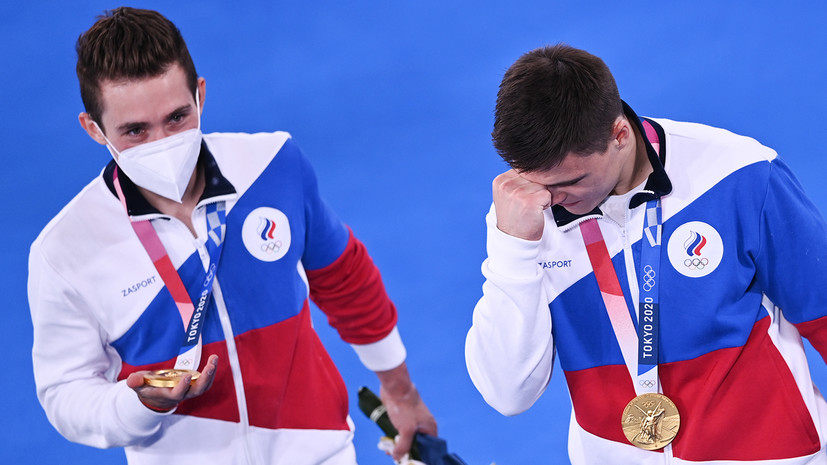Over the past fifty years, such a tiny difference between victory and defeat in men's team gymnastics has never happened at the Olympics. Gymnastic numbers rarely convey to the uninitiated the degree of intensity of the struggle, so I will try to explain it differently: the team finals are six types of programs, in each of which the country is represented by three athletes. A total of 18 approaches to the projectiles. Divide 0.103 by 18, and you get the same value by which each of the Russian guys was better than the opponent in each individual exercise. Have you tried it? Yes, I absolutely agree with you: you can't understand it with your mind, and it's hardly possible to explain it in words.
The last time the Russian men's team won the Games in Atlanta.
But if someone, describing gymnastic success, wants comparisons and parallels, this is definitely not worth doing.
There, in the States, a country fought for victory, which had not previously lost at two Olympics in a row.
Here, in Tokyo, the Russian guys were opposed by China, which won the Games three times over the past 20 years, and Japan with two victories in 2004 and 2016.
Two great gymnastic powers, accustomed to torment the platform, like two beasts of prey - knowingly their own prey.
The first alarm bell, both for those and for others, rang two years ago at the World Championships in Stuttgart, where Russia won the highest team title for the first time in 27 years.
It is interesting that in the composition of that team there were all the current four of triumphants.
“When you leave after the competition, they are slowly forgotten.
There remains a certain high feeling that you are the world champion in the team final, you have the coolest team on the planet ... This is because we have this for the first time ... This was the first time in the history of Russia.
I was not yet in the world when the USSR national team took the team championship for the last time, ”Dalaloyan said then in Stuttgart.
In Tokyo, a similar phrase could well have been repeated by Nagorny: when the Russian national team, led by the great Alexei Nemov, won in Atlanta, Nikita was not yet born.
Legendary Anglo-American director Alfred Hitchcock was once asked why he chose thriller for most of his film work.
And the maestro replied that, in his opinion, horror will never go out of fashion.
Moreover, they are likely to be more and more in demand as the level of well-being and tranquility in the world rises.
Demand for the Olympic Games from the same series.
Monday became very indicative in this regard: gymnasts were fighting on one screen, and at the same time on the next screen two Russian girls were fighting for Olympic gold on the fencing track.
And it was absolutely not clear where to get so much nervous and emotional forces to somehow resist the raging adrenaline.
The fencing final began when the gymnasts had only one apparatus to complete, before which the gap between the Russian boys and the Chinese was reduced to a minimum. And that was exactly the moment when I just wanted to close my eyes, shut my ears, stop time, do anything, just not to see what would happen next. Because the Chinese, like the Japanese, work on the bar like gods, while in Russia in floor exercises, Ablyazin and Dalaloyan are partners with Nikita Nagorny. Both - with very recently experienced and very severe leg injuries, that is, in a state where any landing can become fatal.
After first Denis and then Arthur slightly stepped outside the carpet, losing 0.3 each, it became quite scary.
And it was impossible to imagine at what cost calmness and composure is given to those who continue to work on the platform.
Probably, the incandescence of the situation could make Nagorny lose his head.
But what is there - she could make anyone lose their head.
Take risks, succumb to emotions, lose because of this, losing control over yourself, get involved in a fight with someone in front of everyone, or start destroying the hall in order to release the accumulated aggression.
It was generally the scariest moment of the competition: right before Nikita left, Daiki Hashimoto brilliantly finished his exercise on the crossbar, thanks to which the Japanese team was 0.5 points ahead of the Chinese.
And this meant that in order for the team to remain the winners, Nagorny needed to score a much larger amount of points on the carpet than that which allowed Russia not to yield to the athletes from the Celestial Empire.
Nikita went out onto the carpet, smiling.
How it turned out to correctly execute the combination and gain the necessary amount to win, he can hardly ever explain.
He just landed almost perfectly after every flip and stood rooted to the spot.
As if any additional step would rob him of a year of his life.
Then all four cried right at the platform, childishly burying their wet faces on the shoulders of the coaches.
This happens at the Olympic Games: after the unbearable stress that one has to experience when you win back thousandths of a point in crumbs in your favor, when the concentration is so great that the cheekbones in a smile cramp, and there is no longer the strength to move an arm or a leg, tears become the only available means to keep from going crazy.
And who just came up with the idea of calling it all games?

